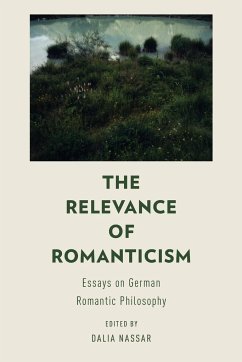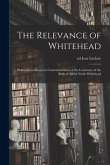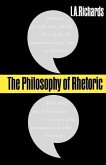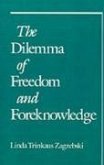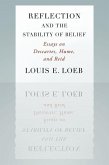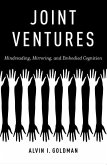The Relevance of Romanticism
Essays on German Romantic Philosophy
Herausgeber: Nassar, Dalia
The Relevance of Romanticism
Essays on German Romantic Philosophy
Herausgeber: Nassar, Dalia
- Broschiertes Buch
- Merkliste
- Auf die Merkliste
- Bewerten Bewerten
- Teilen
- Produkt teilen
- Produkterinnerung
- Produkterinnerung
The Relevance of Romanticism considers the reasons why philosophers have recently become deeply interested in romantic thought. Through historical and systematic reconstructions, the collection offers greater understanding of romanticism as a philosophical movement and deeper insight into the role that romantic thought plays in contemporary philosophical debates.
Andere Kunden interessierten sich auch für
![The Relevance of Whitehead; Philosophical Essays in Commemoration of the Centenary of the Birth of Alfred North Whitehead The Relevance of Whitehead; Philosophical Essays in Commemoration of the Centenary of the Birth of Alfred North Whitehead]() The Relevance of Whitehead; Philosophical Essays in Commemoration of the Centenary of the Birth of Alfred North Whitehead24,99 €
The Relevance of Whitehead; Philosophical Essays in Commemoration of the Centenary of the Birth of Alfred North Whitehead24,99 €![The Philosophy of Rhetoric The Philosophy of Rhetoric]() Ivor A. RichardsThe Philosophy of Rhetoric37,99 €
Ivor A. RichardsThe Philosophy of Rhetoric37,99 €![The Dilemma of Freedom and Foreknowledge The Dilemma of Freedom and Foreknowledge]() Linda Trinkaus ZagzebskiThe Dilemma of Freedom and Foreknowledge82,99 €
Linda Trinkaus ZagzebskiThe Dilemma of Freedom and Foreknowledge82,99 €![Reflection and the Stability of Belief Reflection and the Stability of Belief]() Louis E. LoebReflection and the Stability of Belief57,99 €
Louis E. LoebReflection and the Stability of Belief57,99 €![Out from the Shadows Out from the Shadows]() Out from the Shadows55,99 €
Out from the Shadows55,99 €![Joint Ventures Joint Ventures]() Alvin I GoldmanJoint Ventures45,99 €
Alvin I GoldmanJoint Ventures45,99 €![Argument and Persuasion in Descartes' Meditations Argument and Persuasion in Descartes' Meditations]() David CunningArgument and Persuasion in Descartes' Meditations39,99 €
David CunningArgument and Persuasion in Descartes' Meditations39,99 €-
-
-
The Relevance of Romanticism considers the reasons why philosophers have recently become deeply interested in romantic thought. Through historical and systematic reconstructions, the collection offers greater understanding of romanticism as a philosophical movement and deeper insight into the role that romantic thought plays in contemporary philosophical debates.
Hinweis: Dieser Artikel kann nur an eine deutsche Lieferadresse ausgeliefert werden.
Hinweis: Dieser Artikel kann nur an eine deutsche Lieferadresse ausgeliefert werden.
Produktdetails
- Produktdetails
- Verlag: Oxford University Press
- Seitenzahl: 362
- Erscheinungstermin: 1. April 2014
- Englisch
- Abmessung: 234mm x 156mm x 21mm
- Gewicht: 616g
- ISBN-13: 9780199976218
- ISBN-10: 019997621X
- Artikelnr.: 39742975
- Herstellerkennzeichnung
- Libri GmbH
- Europaallee 1
- 36244 Bad Hersfeld
- gpsr@libri.de
- Verlag: Oxford University Press
- Seitenzahl: 362
- Erscheinungstermin: 1. April 2014
- Englisch
- Abmessung: 234mm x 156mm x 21mm
- Gewicht: 616g
- ISBN-13: 9780199976218
- ISBN-10: 019997621X
- Artikelnr.: 39742975
- Herstellerkennzeichnung
- Libri GmbH
- Europaallee 1
- 36244 Bad Hersfeld
- gpsr@libri.de
Dalia Nassar is a research fellow of the Australian Research Council (ARC) in the philosophy department at the University of Sydney and assistant professor of philosophy at Villanova University. She is the author of The Romantic Absolute: Being and Knowing in Early German Romantic Philosophy 1795-1804 (University of Chicago Press, 2013).
* Acknowledgements
* Abbreviations
* Introduction
* Part 1. German Romanticism as a Philosophical Movement
* Chapter 1. Manfred Frank, What is Early German Romantic Philosophy?
* Chapter 2. Frederick Beiser, Romanticism and Idealism
* Part 2. History, Hermeneutics and Sociability
* Chapter 3. Karl Ameriks, History and German Romanticism
* Chapter 4. Michael N. Forster, Romanticism and Language
* Chapter 5. Kristin Gjesdal, Hermeneutics, Individuality, and
Tradition: Schleiermacher's Idea of Bildung in the Landscape of
Hegelian Thought
* Chapter 6. Jane Kneller, Sociability and the Conduct of Philosophy:
What philosophers can learn from early German Romanticism
* Part 3. Literature, Art and Mythology
* Chapter 7. Richard Eldridge,"Doch sehnend stehst /Am Ufer du"("But
longing you stand on the shore"): Hölderlin, Philosophy,
Subjectivity, and Finitude
* Chapter 8. Brady Bowman, On the Defense of Literary Value: From Early
German Romanticism to Analytic Philosophy of Literature
* Chapter 9. Keren Gorodeisky, "No Poetry, No Reality": Schlegel,
Wittgenstein, Fiction and Reality
* Chapter 10. Laure Cahen-Maurel, "A Simple Wheat Field": A New
Picturing of the Sublime in Caspar David Friedrich
* Chapter 11. Bruce Matthews, The New Mythology: Romanticism Between
Religion and Humanism
* Part 4. Science and Nature
* Chapter 12. Paul Redding, Mathematics, Computation, Language and
Poetry: The Novalis Paradox
* Chapter 13. John H. Smith, The Romantic Calculus: Infinity,
Continuity, Infinitesimal
* Chapter 14. David W. Wood, The Wissenschaftslehre as Mathematics: On
a Late Fichtean Reflection of Novalis
* Chapter 15. Amanda Jo Goldstein, Irritable Figures: Romantic
Philosophy of Science by way of Johann Gottfried Herder
* Chapter 16. Dalia Nassar, Romantic Empiricism after the 'End of
Nature': Contributions to Environmental Philosophy
* Abbreviations
* Introduction
* Part 1. German Romanticism as a Philosophical Movement
* Chapter 1. Manfred Frank, What is Early German Romantic Philosophy?
* Chapter 2. Frederick Beiser, Romanticism and Idealism
* Part 2. History, Hermeneutics and Sociability
* Chapter 3. Karl Ameriks, History and German Romanticism
* Chapter 4. Michael N. Forster, Romanticism and Language
* Chapter 5. Kristin Gjesdal, Hermeneutics, Individuality, and
Tradition: Schleiermacher's Idea of Bildung in the Landscape of
Hegelian Thought
* Chapter 6. Jane Kneller, Sociability and the Conduct of Philosophy:
What philosophers can learn from early German Romanticism
* Part 3. Literature, Art and Mythology
* Chapter 7. Richard Eldridge,"Doch sehnend stehst /Am Ufer du"("But
longing you stand on the shore"): Hölderlin, Philosophy,
Subjectivity, and Finitude
* Chapter 8. Brady Bowman, On the Defense of Literary Value: From Early
German Romanticism to Analytic Philosophy of Literature
* Chapter 9. Keren Gorodeisky, "No Poetry, No Reality": Schlegel,
Wittgenstein, Fiction and Reality
* Chapter 10. Laure Cahen-Maurel, "A Simple Wheat Field": A New
Picturing of the Sublime in Caspar David Friedrich
* Chapter 11. Bruce Matthews, The New Mythology: Romanticism Between
Religion and Humanism
* Part 4. Science and Nature
* Chapter 12. Paul Redding, Mathematics, Computation, Language and
Poetry: The Novalis Paradox
* Chapter 13. John H. Smith, The Romantic Calculus: Infinity,
Continuity, Infinitesimal
* Chapter 14. David W. Wood, The Wissenschaftslehre as Mathematics: On
a Late Fichtean Reflection of Novalis
* Chapter 15. Amanda Jo Goldstein, Irritable Figures: Romantic
Philosophy of Science by way of Johann Gottfried Herder
* Chapter 16. Dalia Nassar, Romantic Empiricism after the 'End of
Nature': Contributions to Environmental Philosophy
* Acknowledgements
* Abbreviations
* Introduction
* Part 1. German Romanticism as a Philosophical Movement
* Chapter 1. Manfred Frank, What is Early German Romantic Philosophy?
* Chapter 2. Frederick Beiser, Romanticism and Idealism
* Part 2. History, Hermeneutics and Sociability
* Chapter 3. Karl Ameriks, History and German Romanticism
* Chapter 4. Michael N. Forster, Romanticism and Language
* Chapter 5. Kristin Gjesdal, Hermeneutics, Individuality, and
Tradition: Schleiermacher's Idea of Bildung in the Landscape of
Hegelian Thought
* Chapter 6. Jane Kneller, Sociability and the Conduct of Philosophy:
What philosophers can learn from early German Romanticism
* Part 3. Literature, Art and Mythology
* Chapter 7. Richard Eldridge,"Doch sehnend stehst /Am Ufer du"("But
longing you stand on the shore"): Hölderlin, Philosophy,
Subjectivity, and Finitude
* Chapter 8. Brady Bowman, On the Defense of Literary Value: From Early
German Romanticism to Analytic Philosophy of Literature
* Chapter 9. Keren Gorodeisky, "No Poetry, No Reality": Schlegel,
Wittgenstein, Fiction and Reality
* Chapter 10. Laure Cahen-Maurel, "A Simple Wheat Field": A New
Picturing of the Sublime in Caspar David Friedrich
* Chapter 11. Bruce Matthews, The New Mythology: Romanticism Between
Religion and Humanism
* Part 4. Science and Nature
* Chapter 12. Paul Redding, Mathematics, Computation, Language and
Poetry: The Novalis Paradox
* Chapter 13. John H. Smith, The Romantic Calculus: Infinity,
Continuity, Infinitesimal
* Chapter 14. David W. Wood, The Wissenschaftslehre as Mathematics: On
a Late Fichtean Reflection of Novalis
* Chapter 15. Amanda Jo Goldstein, Irritable Figures: Romantic
Philosophy of Science by way of Johann Gottfried Herder
* Chapter 16. Dalia Nassar, Romantic Empiricism after the 'End of
Nature': Contributions to Environmental Philosophy
* Abbreviations
* Introduction
* Part 1. German Romanticism as a Philosophical Movement
* Chapter 1. Manfred Frank, What is Early German Romantic Philosophy?
* Chapter 2. Frederick Beiser, Romanticism and Idealism
* Part 2. History, Hermeneutics and Sociability
* Chapter 3. Karl Ameriks, History and German Romanticism
* Chapter 4. Michael N. Forster, Romanticism and Language
* Chapter 5. Kristin Gjesdal, Hermeneutics, Individuality, and
Tradition: Schleiermacher's Idea of Bildung in the Landscape of
Hegelian Thought
* Chapter 6. Jane Kneller, Sociability and the Conduct of Philosophy:
What philosophers can learn from early German Romanticism
* Part 3. Literature, Art and Mythology
* Chapter 7. Richard Eldridge,"Doch sehnend stehst /Am Ufer du"("But
longing you stand on the shore"): Hölderlin, Philosophy,
Subjectivity, and Finitude
* Chapter 8. Brady Bowman, On the Defense of Literary Value: From Early
German Romanticism to Analytic Philosophy of Literature
* Chapter 9. Keren Gorodeisky, "No Poetry, No Reality": Schlegel,
Wittgenstein, Fiction and Reality
* Chapter 10. Laure Cahen-Maurel, "A Simple Wheat Field": A New
Picturing of the Sublime in Caspar David Friedrich
* Chapter 11. Bruce Matthews, The New Mythology: Romanticism Between
Religion and Humanism
* Part 4. Science and Nature
* Chapter 12. Paul Redding, Mathematics, Computation, Language and
Poetry: The Novalis Paradox
* Chapter 13. John H. Smith, The Romantic Calculus: Infinity,
Continuity, Infinitesimal
* Chapter 14. David W. Wood, The Wissenschaftslehre as Mathematics: On
a Late Fichtean Reflection of Novalis
* Chapter 15. Amanda Jo Goldstein, Irritable Figures: Romantic
Philosophy of Science by way of Johann Gottfried Herder
* Chapter 16. Dalia Nassar, Romantic Empiricism after the 'End of
Nature': Contributions to Environmental Philosophy

